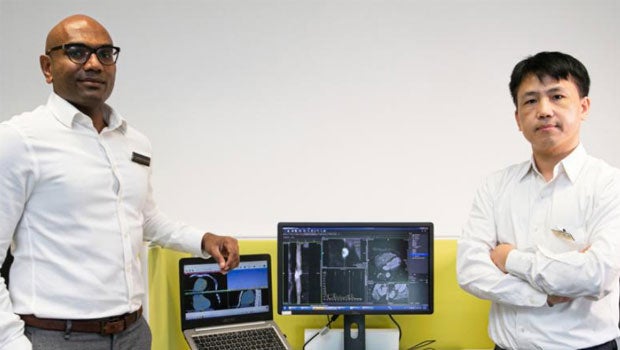
Associate Professor Zhong Liang (right), the Technical Lead of the Laboratory, and Principal Investigator, National Heart Research Institute Singapore, NHCS at the Cardiovascular Systems Imaging and Artificial Intelligence research laboratory. PHOTO: NATIONAL HEART CENTRE SINGAPORE
SINGAPORE - The National Heart Centre Singapore (NHCS) has launched a cardiac imaging research laboratory that harnesses artificial intelligence (AI) to detect and predict heart disease more quickly and precisely.
Launched on Tuesday (March 8), the Cardiovascular Systems Imaging and Artificial Intelligence (CVS.AI) lab is the first of its kind to be set up by a healthcare provider in Singapore and South-east Asia, said NHCS.
The use of AI in detecting and monitoring the progression of heart disease could allow for early intervention and counter the world's top killer disease, which takes about 17.9 million lives each year.
In Singapore, one-third of all deaths are due to cardiovascular disease - with 19 people dying from heart diseases or stroke each day.
NHCS, which sees more than 120,000 outpatients a year, performed nearly 17,000 cardiac scans last year alone.
These are images of the heart and blood vessels taken using methods such as magnetic resonance imaging, computerised tomography and nuclear imaging methods.
The structure and function of the heart and its arteries can be analysed from these scans, such as by detecting plaque on artery walls or heart muscle damage due to blocked blood supply.
"AI can potentially capture and make sense of complex information in a multidimensional manner that cannot be done by a human interpreter - improving predictive ability and reducing labour and time intensive processes in analysing scan images," said Assistant Professor Lohendran Baskaran, clinical lead at CVS.AI and a consultant at NHCS.
Not only can AI analyse the images to a greater level of detail such that it identifies even subtle changes that would escape detection by the human eye, but it also does this in a fraction of the time it takes a radiologist - mere minutes, compared with between two and four hours.
NHCS medical director Terrance Chua said this allows for more precise assessment of patients' risk of heart disease, allowing doctors to prescribe preventive treatments effectively.
"Over time, this can potentially save costs, broaden accessibility of cardiac scans to patients, and improve overall healthcare for our population," Professor Chua added.
Prof Baskaran also said that CVS.AI is armed with the technical hardware and software to securely transmit, store and process patient's information.
The lab's technical lead, Associate Professor Zhong Liang - who is also principal investigator of NHRIS - said that its location at the National Heart Research Institute Singapore (NHRIS) at NHCS in the Singapore General Hospital Campus also "allows for a constant influx of real world data and daily information that can go towards helping the AI algorithms improve".
This is not the first time AI has been used in cardiology in Singapore.
Last year, a team of researchers from Nanyang Technological University, Ngee Ann Polytechnic and NHCS invented an AI-run diagnostic tool that can speed up the diagnosis of cardiovascular diseases with an accuracy of more than 98.5 per cent.
Prof Baskaran said: "Healthcare worldwide will struggle significantly without AI, and in order to maintain a global edge, we must invest in it."













 Get it on Google Play
Get it on Google Play